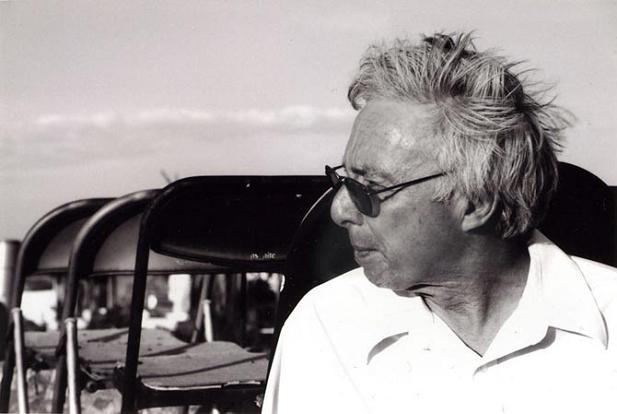Lost in the Humming Air: An interview with Harold Budd Unknown Spins
Interviews, New in Ceasefire, Unknown Spins - Posted on Sunday, April 29, 2012 6:15 - 0 Comments
Harold Budd
‘I got interested in the paintings in a certain group of American and continental artists – Rothko, Serge Poliakoff, Hans Hartung – and they were so attractive to me that I thought, “‘I wonder if there’s a place for that feeling in music?’”
Harold Budd has pursued that question across the worlds of classical composition and pop music over the course of a career spanning nearly fifty years. Works such The Pavilion of Dreams [1978] or The Pearl [1984], while typically described as ‘ambient,’ are indeed closer to the language of painterly abstraction than the sonic wallpaper that ‘ambient music’ increasingly tends to denote.
While undeniably warm and melodic, Budd’s music seems to hang in the air in a way that is sometimes unsettling. As with the art of Rothko and Hartung, the viewer/listener is drawn in to an enveloping visual and aural world, but the place they find themselves can be disconcerting, not quite right. The work that Budd has produced in developing this approach has often appealed to those coming from the more cerebral corners of the pop and rock universe; Brian Eno released The Pavilion of Dreams on his Obscure Music label, and later collaborated with Budd on The Plateaux Of Mirror and The Pearl.
Others who have worked with Budd include Robin Guthrie of the similarly ethereal Cocteau Twins and, perhaps more unexpectedly, Andy Partridge from oddball post-punkers XTC. ‘The truth is, my collaborations have to do with friendship,’ explains Budd. ‘These guys, they’re not consumed by music. They’re consumed by ideas, and intellectual approaches, and literature, and that is so important to me. I never found it in America at all.’
Budd’s work is indeed at odds from the avant-garde world of the American academy in which he started his career. Budd quickly grew tired, however, of the systems-based approaches, derived from Morton Feldman and John Cage, that dominated formal academic composition in the 1960s. ‘Steve Reich, and especially Philip Glass, they do come from an art-school mentality. But it’s still an art that’s based on conceptualism, and I’ve never cottoned on to that whole attitude.’ That said, pieces produced by Budd in this milieu – particularly his first commercially available LP, 1971’s The Oak of the Golden Dreams – still stand as among his best work.
Although clearly still a product of the academy, another key influence apparent here is the world of contemporary jazz: in particular, the hallelujah style of Albert Ayler (with whom Budd had briefly played drums whilst serving in the army). ‘Coeur D’Orr’, especially, features some wild reed work starkly different to piano-led directions Budd would go on to take.
Whilst the influence of free jazz would nudge Budd in some interesting directions, and remain an influence on his later work, it couldn’t shift the trajectory of his attention away from a focus on the mood and feeling of visual art: ‘I didn’t hear it in Ayler, or even in Coltrane really; I did a little in Coltrane, and especially in Pharaoh Sanders. It just wasn’t quite enough. It got close, but it didn’t have the same emotional impact to me.’
Instead, Budd looked across the Atlantic, where a number of musicians were beginning to make music that reflected a similar line of thinking. Foremost among these was Eno, whose sublime Discreet Music [1975] loops and drifts over the course of more than half an hour, seemingly both static and constantly unfurling. ‘When it comes to the use of the studio, I learned everything from Eno,’ says Budd.
Indeed, Budd and Eno share not just an aesthetic approach to ambient music but a strategic way of using the studio as an instrument, and incorporating the play and flow of chance events into the compositional process. These were devices that the duo explored together for the first time on their early eighties albums; ‘I was just feeling my way in the dark. And Brian, also. There was no model to use.’
Having built up a discography impressive for both its depth and the range of its collaborative interests, Budd is now seeking to a return to some of the improvisational attitudes that he rejected as theoretically uninteresting at the outset of his career. His performance at the Holywell Music Rooms earlier this month, where this interview was conducted, saw Budd unreeling stately piano phrases alongside Werner Dafeldecker, a bassist best known for his work in the world of lower-case free improvisation with the group Polwechsel.
‘Sometimes I’m attracted to compatibility, and sometimes I’m attracted to its opposite,’ explains Budd. ‘Working with Werner, he’s involved with a kind of music that I’m not at all; but the combination of the two makes something that neither of us would ever have dreamed of doing. I left that world in my forties, pretty much, and returned to it only fairly recently; in order to loosen things up, I guess.’
Such inquisitiveness is impressive in a composer that, at seventy-five, is still hard on the road. Does he know where these interests might be headed? Budd’s answer suggests a zen-like quality that could almost be Cagean:
‘I’m in a very strange place right now. I don’t listen to music. I look at a lot of art. I’m not sure where I’m going with it. I would say, in other circumstances, that I have a block of some kind…but it doesn’t bother me. It’s not something I have to overcome.’



Leave a Reply